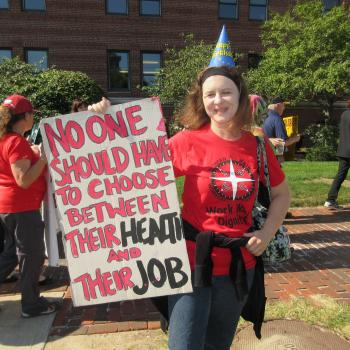In his magisterial work The Four Cardinal Virtues, Josef Pieper concludes his reflection on Justice with a section on “The Limits of Justice.” Here are the last two paragraphs:
Communal life will necessarily become inhuman if man’s dues to man are determined by pure calculation. That the just man give to another what is not due to him is particularly important since injustice is the prevailing condition in our world. Because men must do without things that are due to them (since others are withholding them unjustly); since human need and want persist even though no specific person fails to fulfill his obligation, and even though no binding obligation can be construed for anyone; for these very reasons it is not “just and right” for the just man to restrict himself to rendering only what is strictly due. For it is true, as Thomas says, that “mercy without justice is the mother of dissolution”; but, also, that “justice without mercy is cruelty.”
Now it becomes possible to state the inner limits of justice: “To be willing to watch over peace and harmony among men through the commandments of justice is not enough when charity has not taken firm root among them.” (pp. 112-113)

 The fact is that once sin has entered the world, strict justice no longer works to establish equilibrium. What occurs when strict justice is attempted are blood feuds, sometimes lasting for generations. The simple fact is that, in most cases (maybe all cases), that of which which one is deprived by another cannot be restored. This is obvious if you kill my brother. There is no way to get my brother back. But it is also true if you steal my TV. Even if you buy me another, better, TV, you cannot give me back the night when I missed watching my favorite pitcher pitching a no-hitter because I had no TV. Heck, you can’t even really give me back Grey’s Anatomy. You can buy me a DVD, but you can’t give back the experience of watching my show, on my night, in my home. The moment has passed.
The fact is that once sin has entered the world, strict justice no longer works to establish equilibrium. What occurs when strict justice is attempted are blood feuds, sometimes lasting for generations. The simple fact is that, in most cases (maybe all cases), that of which which one is deprived by another cannot be restored. This is obvious if you kill my brother. There is no way to get my brother back. But it is also true if you steal my TV. Even if you buy me another, better, TV, you cannot give me back the night when I missed watching my favorite pitcher pitching a no-hitter because I had no TV. Heck, you can’t even really give me back Grey’s Anatomy. You can buy me a DVD, but you can’t give back the experience of watching my show, on my night, in my home. The moment has passed.
In stealing my TV you took more than a material object, you took away experience. And not just experience of watching TV, but also experience of security. Ask anyone whose home has been broken into what the worst part of it was. Not the missing electronics, but the sense of vulnerability.
We could continue in this vein. The point is that sin cannot be undone. When Jesus appeared in the upper room he appeared wounded. Even the resurrection doesn’t undo sin. Therefore, if we seek a theory of atonement whereby strict justice is perfectly fulfilled, we will be left unsatisfied. Strict justice cannot be perfectly fulfilled. No, what is needed is not bare, abstract justice, but forgiveness. Without forgiveness, without mercy, justice damns the whole world.
Brett Salkeld is a doctoral student in theology at Regis College in Toronto. He is a father of three (so far) and husband of one. He is the author of Can Catholics and Evangelicals Agree about Purgatory and the Last Judgment?











